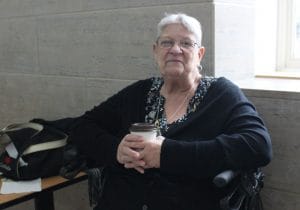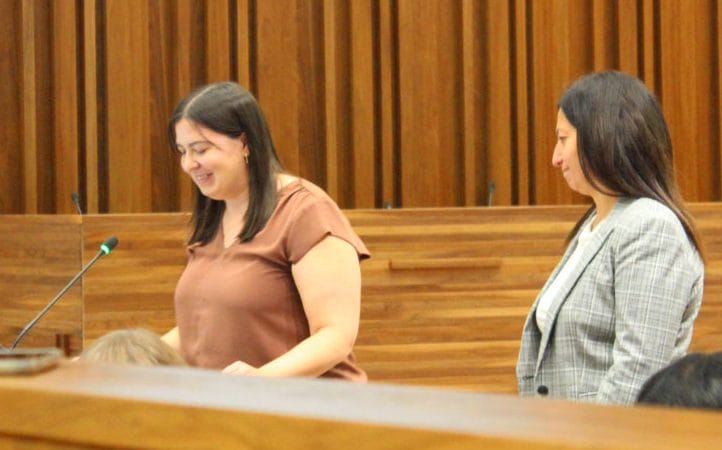GUELPH – People living in poverty often face abysmal choices.
Do they pay rent or purchase necessary medications? Do they buy groceries or pay for therapy they know is crucial?
Poverty is a social determinant of mental health – a societal problem that increases risk and severity of mental illness.
Other social determinants include disability, race, employment, gender, sexual orientation, intergenerational trauma, discrimination and stigma.
These social determinants were the focus of the 24th annual Guelph Mayor’s Event for Mental Health, Connecting the Dots, held at Guelph City Hall on Oct. 10.
“You never know what someone else is going through,” said Guelph mayor Cam Guthrie.
That includes your family, your coworkers, and anyone else in the community – “even politicians,” he said.
Helen Fishburn
Canadian Mental Health Association of Waterloo Wellington chief executive officer Helen Fishburn said the annual event usually has a “positive and uplifting” message, but things were different this year.
“That doesn’t feel like the reality we live in right now,” Fishburn said solemnly.
While driving to the event, Fishburn said attendees likely listened to the radio, where journalists shared devastating news from Palestine and Israel.
After parking they likely walked through downtown Guelph, where people on the streets are visibly suffering, she said.
“It is a dark place in our world right now, and this is really the new normal that doesn’t just disappear,” she noted.
“As we process what’s happening in the world around us … any difficulty we have in coping with this is not a sign of weakness.
“It is a sign of humanity. We care so much.”
But dwelling in that darkness will not support mental health. “The antidote to mental illness,” Fishburn said, “is hope, and care, and treatment.
“What do we need to do? We need to show up,” she said. “Stand back from our judgements.”
Some people are quick to blame individuals for their struggles, Fishburn said, with attitudes like “just stop using” or “just get a job.”
But if it were that simple, nobody “would want to sit in this level of discomfort – in this level of palpable pain,” she assures.
Three speakers who have experienced poverty and mental illness shared harrowing stories of their struggles and successes, and how the social determinants of mental health exacerbated their troubles.
Barb McPhee
Barb McPhee, president of Better Beginnings Provincial Network and manager of Guelph’s North End Harvest Market, was welcomed to the podium with enthusiastic cheers from attendees filling the council chamber.

Barb McPhee shared her story of a lifetime of poverty during the Guelph Mayors Event for Mental Health on Oct. 10. Photo by Robin George
McPhee shared stories from 70 years of living in poverty and a period of homelessness in her late 50s and early 60s. Though her experiences are filled with sorrow, McPhee wove strands of humour throughout the tales.
“My journey was a struggle but also a success,” she said.
“No matter what life is like we all have a story to tell,” McPhee said.
She encourages people to take moments in their busy lives to smile at strangers, listen to a story someone bravely shares, or muster the courage to tell their own tale.
Sharon Henriques
“For some of us, the cards are stacked against us from birth,” said community advocate Sharon Henriques, but no one is immune to poverty – “anyone can lose their job, or get sick, and send them into that downward spiral.”
Henriques reflects on working full time and not being able to make ends meet or spend quality time with her children.
The smallest setback, like an expensive and necessary car repair, has a massive impact on people living in poverty, she said.
And support can make the world of difference, but Henriques learned to avoid asking for help.
Because the one time she reached out to her local government for support paying her heating bill, a social worker showed up at her door and threatened to take her children away if she didn’t get the heat turned back on immediately.

Sharon Henriques, right, shared stories of her struggles with poverty and mental health. She stands with Wellington councillor David Anderson, middle, and Guelph councillor Dominique O’Rourke. Photo by Robin George
This year, Henrique experienced months of homelessness after another setback: a fire in her apartment building.
“You never know what people are going through,” she said, and a supportive gesture as simple as “a smile can have a huge impact on the heart and mind of someone who is struggling.”
Maggie Phelan
Community advocate Maggie Phelan shared her story of surviving abuse, experiencing psychosis and overcoming addictions to alcohol and drugs.
Phelan began turning to drugs and alcohol to help cope with her struggles when she was 11.
While in an alcohol detox program as an adult she entered an abusive relationship. She started using alcohol and drugs again, leading to a period of homelessness.
“I was one of those people,” she said, someone “people love to make fun of,” sleeping outside on the cold streets of Brantford.
Phelan was able to move to a women’s shelter in Brantford, and then to a second women’s shelter in Guelph. From there, she gained access to a subsidized bachelor apartment.
“It took me being severely abused and homeless to have access to that,” Phelan said.

Maggie Phelan talked about her struggles with alcoholism, abuse and homelessness during the Guelph Mayors Event for Mental Health. Photo by Robin George
But housing didn’t end her struggles, and Phelan started “losing touch with reality.” She was experiencing psychosis and felt desperate and terrified.
Phelan was often criminalized instead of supported, and “being surrounded by armed police officers was not the care I needed,” she said.
She needed counselling, but the Ontario Disability Support Program does not cover the cost, and she was unable to afford it on her own.
“I hit my own rock bottom and I decided I was done,” Phelan said.
Soon after, Phelan found out she was pregnant and left her abuser for good.
“I made a sacred vow to myself that I would never go back,” she said.
Now, Phelan has been sober for almost six years and is continuing to work through the 12-step Alcoholics Anonymous program.
She said she’s also continuously forced to prove that she’s “poor enough and disabled enough” to receive support.
She is proud of her healthy, happy five-year-old and her own ability to “take the dark lessons from my past and transmute them into light.”
The audience rose to their feet to give Phelan a long standing ovation when she finished sharing her story.

Director of Guelph and Wellington Task Force for Poverty Elimination Dominica McPherson, left, and project manager of Guelph Wellington Local Immigration Partnership Leen Al-Habash spoke about the social determinants of mental health. Photo by Robin George
Dominica McPherson
“Nothing has a bigger impact on mental health than the social determinants,” said Guelph and Wellington Taskforce for Poverty Elimination Dominica McPherson.
“Our system and policies do not allow people to have good mental health.”
For example, Ontario Works provides $733 per month for a single adult, while the average cost to rent a one-bedroom apartment in Guelph is over $2,000.
“There is a direct impact from poverty on mental health,” she said, and “too many people are falling through widening cracks.”
McPherson said the solution is a group effort.
“When we work together we can push for the changes that we need to see,” and every effort to challenge stigmas and misconceptions makes a difference, no matter how small, she noted.
Leen Al-Habash
Guelph Wellington Local Immigration Partnership project manager Leen Al-Habash spoke about the “grave adverse impact” of discrimination on mental health.
“We all bleed the same when we experience discrimination,” she said, as people often internalize the discrimination, feeling discouraged, ashamed, anxious and depressed.
Tears welled in Guthrie’s eyes and his voice broke with emotion while he thanked the speakers for sharing their stories.
“We need to invest in people,” he said with gumption.
Guthrie stressed the importance that the event be “more than just a blip on the calendar,” but a reminder to continue having conversations about mental health struggles and supports all year long.
The Mayor’s Event for Mental Health was started in 2000 by then-mayor Joe Young to coincide with World Mental Health Day on Oct. 10.




